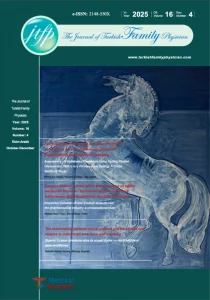Psychosocial Health Level and Related Factors in Pregnancy
Objective: This study was conducted to determine the psychosocial health level and related factors in pregnancy.
Method: This cross-sectional study was conducted on 564 pregnant women who applied to a public hospital’s pregnancy outpatient clinic between March-September 2017. Data were obtained through “Personal Presentation Form” and “Pregnancy Psychosocial Health Assessment Scale (PPHAS)”. The data were analyzed by using number, percentage, mean, standard deviation, independent sample t test and anova analysis were used.
Results: The mean age value of the participants was 28.75 ± 6.2; 25.2% of them were high school graduates and 66.5% stated that the income was equal to the expenses. The average total score of the PPHAS was 3.20 ± 0.5. PPHAS “Pregnancy and Partner Relationship” subscale point mean score was 2.36±0.1 “Anxiety and Stress” subscale mean score was 3.15 ± 0.5 “Domestic Violence” subscale point mean score was 3.97 ± 1.3 “Psychosocial Support Requirement” subscale mean score was 3.25 ± 0.6 “The “Family Characteristics” subscale mean score was 3.10 ± 0.44 and “Physical-Psychosocial Changes Related to Pregnancy” subscale mean score was 3.19 ± 0.6 (p<0.05, p<0.01). Psychosocial health level was found to be influenced by socio- demographic and obstetric characteristics in pregnancy.
Conclusion: Psychosocial health level in pregnancy affected on socio-demographic characteristics like age group, education level, perceived income status, type of place of residence and type of family and the obstetric characteristics like trimester, planned pregnancy, information in pregnancy, number of visits. It is observed that the residence and level of education affected all subdimensions and the psychosocial health level of the pregnants who live in the city centrum and graduated from university is higher. The results show that psychosocial health level in pregnancy is affected from socio-demographic and obstetric characteristics and new studies are needed.
References
- Özorhan EY, Ejder AS, Şahin AÖ. Gebelikte ruh sağlığı. Yıldırım Beyazıt Üniversitesi Sağlık Bilimleri Fakültesi Hemşirelik E-Dergisi 2014; 2(3): 33-42.
- Körükcü Ö, Deliktaş A, Aydın R, Kabukcuoğlu K. Gebelikte psikososyal sağlık durumu ile doğum korkusu arasındaki ilişkinin incelenmesi. Clin Exp Health Sci 2017; 7: 1-6.
- Şahan Ö. Erken Gebelik Döneminde Yaşanan Bulantı Kusma Sıklığı ve Bulantı Kusmanın Yaşam Kalitesine Etkisi. Sağlık Bilimleri Enstitüsü, Hemşirelik Anabilim Dalı. Yüksek Lisans Tezi. Konya, Selçuk Üniversitesi, 2012.
- Haakstad AHL, Torset B, Kari B. What is the effect of regular group exercise on maternal psychological outcomes and common pregnancy complaints? An assessor blinded RCT. Midwifery 2016; 32(6): 81-6.
- Gümüşdaş M, Ejder AS, Özorhan EY. Riskli olan ve olmayan gebelerin psiko-sosyal sağlıklarının karşılaştırılması. HSP 2014;1(2): 32-42.
- Boybay KS, Dereli YS. Son trimester nullipar gebelerde bazı sosyo-demografik ve obstetrik özelliklerin psikososyal sağlık düzeyine etkisi. Ege Üniversitesi Hemşirelik Fakültesi Dergisi 2015, 31(2): 53-66.
- Karaçam Z, Ançel G. Depression, anxiety and influecing factors in pregnancy: a study in Turkish population. Midwifery 2009; 25(4): 344-56.
- Kuğu N, Akyüz G. Gebelikte ruhsal durum. CÜ Tıp Fakültesi Dergisi 2001;23(1):61-4.
- Yıldız H. Gebelikte psikososyal sağlığı değerlendirme ölçeği geliştirme çalışması. Maltepe Üniversitesi Hemşirelik Bilim ve Sanatı Dergisi 2011; 4(1): 64-71.
- Bernard O, Gibson RC, McCaw-Binns A, Reece J, Coore-Desai C, Shakespeare-Pellington S, et al. Antenatal depressive symptoms in Jamaica associated with limited perceived partner and other social support: A cross-sectional study. PLOS ONE 2018; 13(3): 1-19.
- Şahin P. Gebelikte Depresyon ve Anksiyete Belirti Düzeyleri ve İlişkili Faktörler. Sağlık Bilimleri Fakültesi, Hemşirelik Anabilim Dalı. Yüksek Lisans Tezi. Mersin, Mersin Üniversitesi, 2015.
- Uçar H. Gebelerin Psikososyal Sağlık Durumları ile Annelik Rolü Arasındaki İlişki. Sağlık Bilimleri Enstitüsü, Ebelik Anabilim Dalı. Yüksek Lisans Tezi. Erzurum, Atatürk Üniversitesi, 2014.
- Sözeri C. Gebelikte psikososyal sağlığın değerlendirilmesinin doğum sonu depresyonu belirlemedeki etkisi, Sağlık Bilimleri Enstitüsü Doğum ve Kadın Hastalıkları Hemşireliği. Yüksek Lisans Tezi. İstanbul, Marmara Üniversitesi, 2011.
- Kaplan S, Bahar A, Sertbaş G. Gebelerde doğum öncesi ve doğum sonrası dönemlerde durumluk kaygı düzeylerinin incelenmesi. Atatürk Üniversitesi Hemşirelik Yüksekokulu Dergisi 2007;10(1):113-21.
- Sahin S, Ilcioglu K, Unsal A. Domestic Violence, Depression and Anxiety During Pregnanc. HEAD 2017; 14(3): 204-12.
- Bozkurt ÖD, Daşıkan Z. Gebelikte eş şiddeti: Risk faktörleri, sağlık sonuçları ve tarama araçları. Turkiye Klinikleri J Obstet Womens Health Dis Nurs 2016; 2(2): 15-22.
- Mermer G, Bilge A, Yücel U, Çeber E. Gebelik ve doğum sonrası dönemde sosyal destek algısı düzeylerinin incelenmesi. Journal of Psychiatric Nursing 2010;1(2):71-6.
- Wall V, Premji S.S, Letourneau N, McCaffrey G, Nyanza E. C. Factors associated with pregnancy-related anxiety in Tanzanian women: a cross sectional study. BMJ open 2018; 8: 1-8.
- Şahin EM, Kılıçarslan S. Son trimester gebelerin depresyon ve kaygı düzeyleri ve bunları etkileyen etmenler. Trakya Univ Tıp Fak Derg 2010; 27(1): 51-8.



